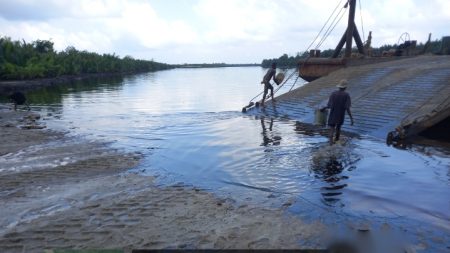 05 June 2013, Lagos – TRADE Union Congress of Nigeria, TUC, has said besides inept leadership at most levels, the epileptic and inconsistent electricity supply is the greatest problem facing the Nigerian nation.
05 June 2013, Lagos – TRADE Union Congress of Nigeria, TUC, has said besides inept leadership at most levels, the epileptic and inconsistent electricity supply is the greatest problem facing the Nigerian nation.
The body equally condemned the prolonged importation of petroleum products into the country and the huge loss of foreign exchange that follows it and calls on government to immediately refurbish all the old refineries to ensure they operate optimally.
Speaking in Abuja, President of TUC, Comrade Peter Esele, said, “The power sector has continued to be a source of worry to all of us despite reforms, yet the importance of electricity to employment and development cannot be over-emphasized. Believing that the government’s recent attempts at liberalising the sector will bring succour to the country, we may well say that there could be a silver-lining in the dark cloud.
Although the labour issues connected to liberalisation have not been fully resolved, it is salutary that government is at least concerned as it appears that effort is being made not to short-change labour this time around. We hope this turns out to be true, and soonest too.
“It is common knowledge that, virtually every household in Nigeria now owns a generator. Several persons even have inverters and battery backups installed in their homes because the government has consistently proven itself incapable of making adequate supply of electricity available to the masses.
Where it is available, the charges are indiscriminate and unpredictable, irrespective of whether the particular consumer actually used it or not. Electricity is an absolute necessity to the industrialisation that we all seek. Apart from inept leadership at most levels, the epileptic and inconsistent supply of electricity is perhaps the greatest problem that we face as a nation today.
Going by our last count, there are just 16 power plants in the country, with the Power Holding Company of Nigeria owning 10 of them while the remaining 6 are owned by independent producers. Despite presidential assurances that the country’s total electricity supply will hit the 6000 MW mark by the end of 2009, the level of production i
s still less than 4000 MW three years later. And this is a country with a population of over 160 million people.”
According to him, “We obviously need to have more players in this power and energy field. Meanwhile Brazil with a population of 192 million people, produces over 100,000 MW of power, while South Africa – whom we helped to attain independence and which has a population of about 50 million people – generates over 40,000 MW of power.
The difference is clear and painful. We understand that the causes of this appalling situation include incompetent management, poor maintenance culture, inadequate funding, corruption, facilities vandalism, etc. But these are all issues that the government can and must tackle decisively and promptly if we are to venture into the group of twenty most developed nations by the year 2020. Indeed, there is no gainsaying that there is urgent need for substantial improvement in the generation and distribution of power nationwide.”
“The government should even explore alternative sources of energy (e.g. the large-scale use of solar power and gas turbines). We also advise that the power sector be fully deregulated to allow for competition and greater efficiency. For starters, the federal government should immediately initiate and facilitate the amendment of relevant statutes to give states that are ready to distribute power for their needs the leeway to do so. The government should also increase funding for the sector and ensure effective security against vandalism and theft of electrical equipment, etc. Please let there be light.”
On Oil and Gas sector, Esele said, “We strongly condemn the prolonged importation of petroleum products into this country and the huge loss of foreign exchange that it occasions. This ugly situation also means that we are indirectly stimulating massive creation of jobs in those countries from whom we buy the petroleum products, while our own people seek for jobs here at home.
As a panacea to this, the government should immediately refurbish all the old refineries to ensure that they operate optimally.
*Victor Ahiuma-Young, Vanguard



